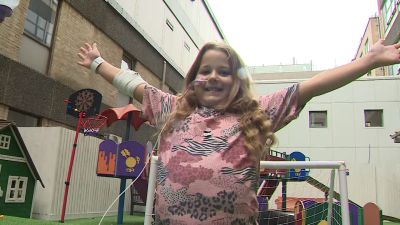How PE lessons at Addenbrooke's Hospital helped young patient get into football

PE lessons at a hospital are helping to put a big smile on the faces of young cancer patients, like Ella Marsh - who rediscovered her love of football.
She has got chronic kidney disease and is being treated at Addenbrooke's Hospital in Cambridge.
Normally she would spend a lot of time in bed, but after PE lessons were introduced, she has had something to look forward to.
Ella said: "I come here because I like football. So I thought if we're doing football here, then I'm going to give it a go.
"Even though I'm on this to help," she said pointing to the machine attached to her, "I can still do it."
Kelly Gilbert, Ella's mother, said: "When we come here she does do a bit of school and she does enjoy it, and then when she goes back to the bed, she's a bit down.
"So when they said about a PE lesson I [asked] 'are you going to do it?' Because usually when I ask her to walk around the ward, she doesn't want to.
"She did it, she came back smiling, she was a lot more upbeat, so I think it's a brilliant idea."
Thought to be a hospital first, tailored PE lessons are being offered to children who are undergoing long-term treatment at Addenbrooke's.
It is a collaboration between Pilgrim Pathways School - which provides education for young people with complex mental and physical health needs during their hospital stay - and local charity Kick.
The benefits have been huge, say those behind the project.
Rebecca Knowles, a physiotherapist at Addenbrooke's Hospital, said: "We know that children undergoing some of the most gruelling treatments, like cranial spinal radiotherapy that can have really significant long term impacts on their cognitive development, if they exercise during their treatment, we see really beneficial changes in their brain.
"They have improved reaction times, improved processing speed, better memory, they're less likely to have infections which means they're more likely to complete their treatment plans.
"So moving during treatment is really important for these children, even more so than anyone else."
Want a quick and expert briefing on the biggest news stories? Listen to our latest podcasts to find out What You Need To Know...